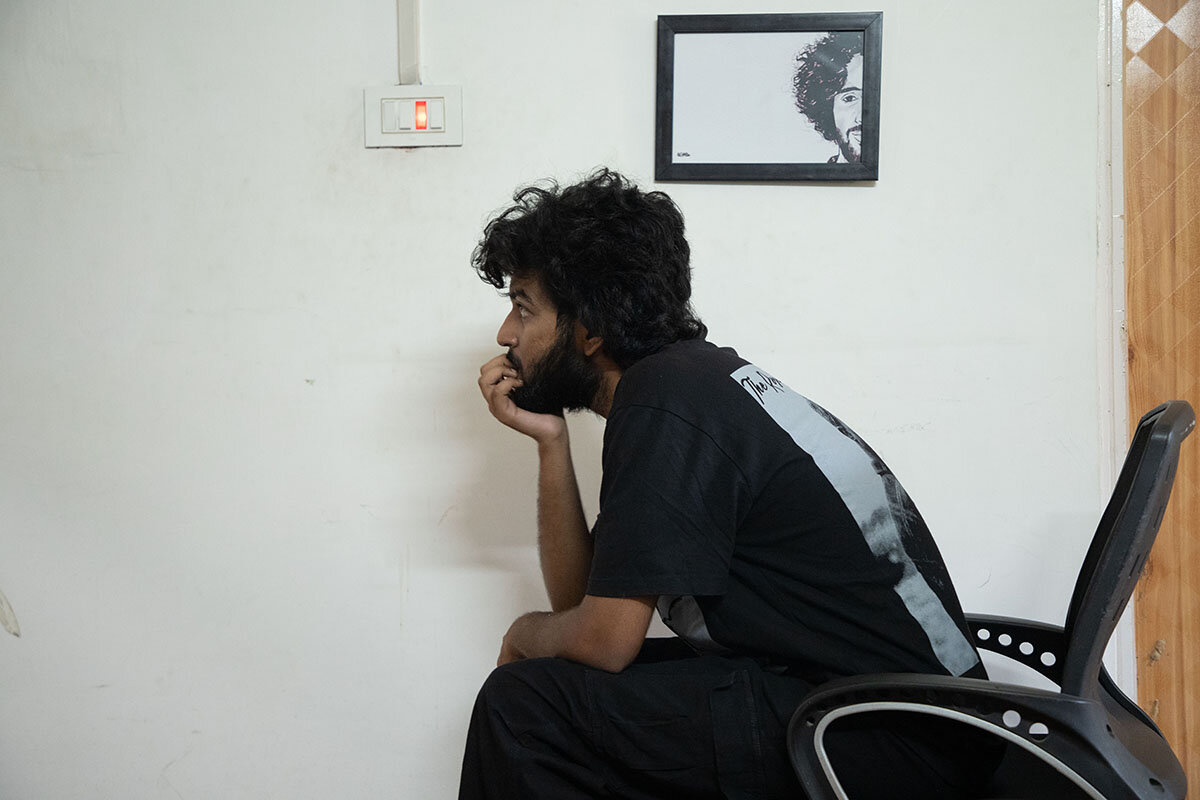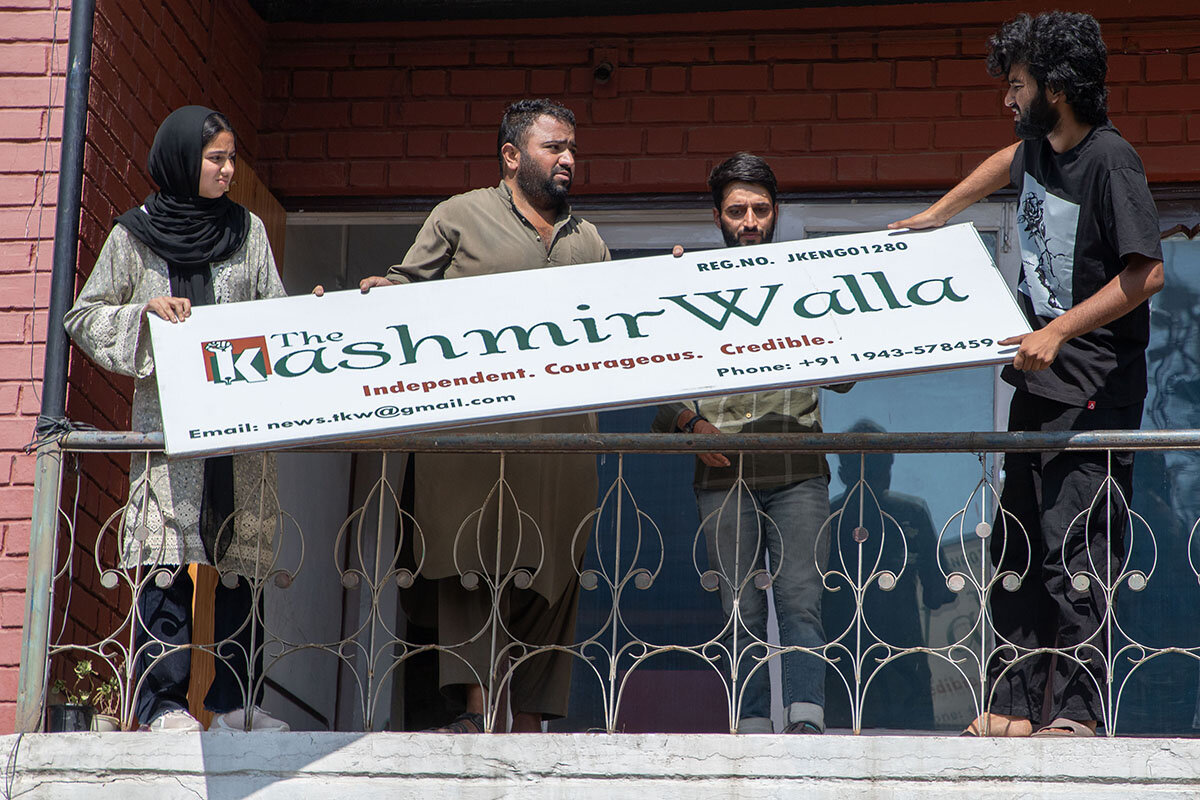Editor jailed, staff evicted, website shut: An Indian newsroom’s fate
| Srinagar, India; and Boston
On the day its lights went out, The Kashmir Walla’s newsroom was busier than it had been in months.
The embattled news site’s remaining six staffers gathered Monday at their apartment-turned-office, joined by former colleagues and fellow journalists looking to bear witness to the end of an era. After a round of tea, the group began loading furniture into a pickup truck.
Three framed pictures of founding editor Fahad Shah – who has spent more than a year and a half in prison – were tucked carefully into a cardboard moving box.
Why We Wrote This
A story focused onPress freedom, a bellwether of democracy, is under assault in India. The government’s closure of an independent news website in Kashmir bodes ill for media elsewhere in the country.
Over the weekend, the Indian authorities blocked access in India to the paper’s website and social media accounts, effectively closing down one of the last few independent media outlets in Indian-controlled Kashmir. At the same time, the staff’s office landlord evicted them.
The Kashmir Walla’s closure is both shocking and expected. Shocking because the final blows came quickly, without warning or explanation. But expected because it also marked the culmination of a harassment campaign stretching back to 2019, which included the arrest of two staffers, regular police questioning, and a newsroom raid.
The story of The Kashmir Walla is the story of press freedom in Kashmir and, media watchdogs say, in India more broadly. The fall of yet another outlet – one that had become known for its staffers’ feisty resilience and courage – has fueled concerns that Indian democracy is in retreat.
Blocking the paper’s website and social channels “marks a new low for press freedom in the region,” says Beh Lih Yi, Asia program coordinator at the Committee To Protect Journalists.
“It is so harsh and jarring,” adds Anuradha Bhasin, executive editor of the Kashmir Times, one of the oldest and most respected English-language newspapers in Kashmir. “It is also to set an example for the rest of them [critical media], not just in Kashmir but in India, where a similar experiment is being emulated,” she says.
From startup to stalwart
The Kashmir Walla began life more than a decade ago as a blog, and evolved into a respected online newsmagazine where young journalists could cut their teeth reporting on everything from outbreaks of political violence to local rugby games.
Covering Kashmir was never easy – the disputed, majority-Muslim territory has long been one of the most militarized places in the world. But the challenges facing local media grew exponentially in 2019 when the Indian central government revoked Kashmir’s autonomy and imposed a monthslong communications blackout.
A slew of policy changes suddenly made it even riskier to criticize the government, and many prominent news outlets shuttered or self-censored.
Yet under Mr. Shah’s mentorship, The Kashmir Walla staff beat on, capturing stories it often had no means of publishing. Eventually, staffers found ways of bypassing the blackout, and when the lockdown eased, they formally relaunched – albeit with a slower internet connection.
The Kashmir Walla’s profile grew as it became a regional stronghold for independent news, and in 2022, when Mr. Shah was arrested for allegedly publishing “anti-national content,” The Kashmir Walla team remained on task. Yashraj Sharma, the paper’s 23-year-old interim editor, has spent the last year coordinating Mr. Shah’s legal battle while managing The Kashmir Walla through financial struggles and ongoing harassment. He is also facing legal charges over an article he wrote about the Indian army.
“The Kashmir Walla was a rare news portal, among some other small portals, which have still been reporting,” says Ms. Bhasin of the Kashmir Times. But that reporting was “reduced to a trickle” compared with the website’s heyday, she points out.
Now, that trickle has dried up.
While the outlet’s Facebook, Twitter, and webpage are visible outside the country, they have all been blocked in India, cutting the paper off from its primary audience and effectively barring The Kashmir Walla from publishing. The newspaper’s service provider says the order came from the government under the Information Technology Act, 2000.
This is “probably the first case of how IT rules have been used to put off a news website and its social media in India,” says Ms. Bhasin, author of “A Dismantled State: The Untold Story of Kashmir After Article 370.”
A broader loss
When she heard that The Kashmir Walla was closing, journalist and author Seema Chishti says she experienced a “mix of feeling sad and suffocated.”
“There’s a fellowship we feel with any website trying to tell a story honestly,” says the editor of Delhi-based news site The Wire, adding that the crackdown on The Kashmir Walla drove home the vulnerability of all independent media in India.
India dropped to 161st out of 180 countries on the World Press Freedom Index this year, putting it in the red zone along with North Korea, China, and Saudi Arabia. Throughout the country, journalists have been questioned, arrested, and put under surveillance in retaliation for critical reporting.
Justifications for these attacks vary – authorities have at times cited national security, tax, and IT laws – but rights experts say the real reason is clear. In the words of Ms. Chishti, “The charge is journalism.”
“We cannot afford to drop the ball on what’s happening in Kashmir,” she says. “Information is key to the quality of democracy,” and when it’s compromised, Indians lose “the biggest roadblock” to authoritarianism.
In Srinagar, readers of The Kashmir Walla are feeling that loss sharply today.
“The work The Kashmir Walla did was exceptional,” says Tauseef Ahmad, a student at a local university. “They were bringing to us stories which other media organizations did not dare to cover.”
After 2019, he says that other Kashmiri media became timid at best, government mouthpieces at worst. But he could trust The Kashmir Walla to report bravely on human rights abuses throughout the region.
“Their ground reports would be full of detail,” he says. “It was one of the last news outlets in Kashmir where one would expect some truth and real reporting.”
The government has so far seemed impervious to inquiries into its press freedom record, but Ms. Bhasin believes that international criticism can still make a difference.
“The voices have to be much more consistent; they have to be louder,” she says, adding that the crackdown in Kashmir should matter to any governments or individuals “who believe in democratic and liberal values.”
Editor’s note: Fahad Shah is a regular Monitor contributor. We, along with other news outlets, are advocating his release. You can find our joint statement here.







